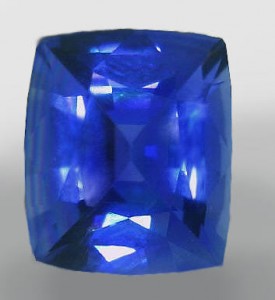
Burmese Ruby set with Trillion Diamonds
Myanmar (formerly known as Burma) is known for its exceptional
rubies. It is not widely know that Myanmar also produces very fine
quality sapphires.
Sapphires from this country command very high prices for the top
quality gemstones with intense or vivid saturation with rich royal blue
color. The best sapphires maintain their exceptional color under all
lighting conditions, incandescent, daylight and fluorescent, something
you rarely see in sapphires. These sapphires do not have the velvety
appearance that Kashmir sapphires are known for. Just as with any
origin, not all sapphires from Myanmar are so outstanding. Some
sapphires are dark or even very light in color.

Fine Burmese Sapphire (from Myanmar)
Rubies and sapphires have been mined in Myanmar for about 800 years. Sapphires are about 10 percent of the output.
Mining has been sporadic over the years due to the remote location.
Even today, political and economic troubles limit mining activities.
Mining is done by government-run and private businesses using both
mechanized and primitive techniques. Once the rough is mined, it often
heads for Thailand, where the majority of sapphire and ruby fashioning
(treating and cutting) is done. Some gems leave Myanmar through
unauthorized channels and smuggling is common.
Most Burmese sapphires are heat treated to remove or reduce the silk
inclusions. Heat treatment improves the luster and clarity and it can
also lighten the darker stones. Because of their origin, fine Burmese
sapphires do command higher prices than sapphires of other origins like
Madagascar or Montana, but identifying the origin can be difficult if
not impossible. Origin identification is most often possible through the
identification of that origin’s characteristic inclusions. But since
inclusions can be significantly altered by heat treatment,
identification can become impossible after heat treatment has been
performed.